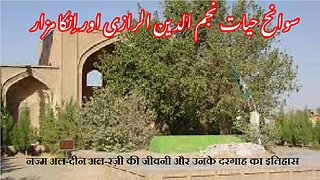Premium Only Content

Is Shari`ah Comprehensive | کیا شریعت جامع ہے؟
@islamichistory813 #Shari`ah #IslamicLaw #LegalFramework #MuslimLife #FamilyLaw #Economics #Governance #ModernWorld
Is Shari`ah Comprehensive?
Asslamoalaikum, sisters brothers friends and elders, Shariah, or Islamic law, is a complex and comprehensive legal framework that governs all aspects of a Muslim's life. In this thought-provoking video, we explore the question: Is Shariah truly comprehensive? We delve into the origins of Shariah, its key principles, and how it impacts various facets of society, including family law, economics, and governance. please be with us upto end of first and second part which will be described tomorow same time on this topic as we examine the depth and breadth of Shariah and its relevance in the modern world.
Does Islamic Shari`ah offer solutions for all issues – political, social and economic – in detail? If there arises an issue to which there is no reference in the Islamic system of law, where do we turn to find an answer?
The Islamic system of law (Shari`ah) provides all that people need of rulings regarding all their affairs, because it is the final system of law, the perfect and complete religion.
Is Shari`ah comprehensive?
The Islamic system of law (Shari`ah ) that Allah, may He be Exalted, revealed to His slaves covers all that people need with regard to their creed, their acts of worship, and their interactions with one another, because it is the final religion and system of law, with which the final Prophet (blessings and peace of Allah be upon him) was sent to all people. So there is no prophet after him and no law after his law. Even ‘Isa (peace be upon him), when he comes down at the end of time, will judge in accordance with it.
The one who reflects on the Quran and studies the Sunnah, and examines the books of jurisprudence and novel issues will realise that with certainty.
The rulings are either specifically mentioned in the religious text of the Quran and Sunnah – this is called the fundamental rulings (Usul Al-Ahkam), and most of what people need can be found in these rulings. Or the rulings are not specifically mentioned in the religious texts, but the jurist can find out the ruling concerning a matter by examining other Shar`i evidence, such as the reports reported from the Companions, or analogy (Qiyas) with the rulings mentioned in the text, or Istis-hab (assumption of the continuation of a fact in the absence of proof to the contrary) or Masalih Mursalah (the public interest) or barring means that lead to evil.
Hence Allah, may He be Exalted, says (interpretation of the meaning):
Allah Say,in surah [Al-An‘am verse 114] “Then is it other than Allah I should seek as judge while it is He who has revealed to you the Book explained in detail?” And those to whom We [previously] gave the Scripture know that it is sent down from your Lord in truth, so never be among the doubters.}
and said in surah An-Nahl verse 89 {And We have sent down to you the Book as clarification for all things.}
In the Hadith it says: “There is no deed that brings a person closer to paradise but I have enjoined it upon you, and there is no deed that brings a person closer to hell but I have forbidden it to you. No one of you should think that his provision is slow in coming, for Jibril inspired to me that one of you will never depart this world until he has received his provision in full. So fear Allah, O people, and be moderate in seeking provision. If any of you think that his provision is slow in coming, let him not seek it by disobeying Allah, for Allah’s bounty cannot be attained by disobeying Him.” (Narrated by Ibn Abu Shaybah in Al-Musannaf, 34332 and by Al-Hakim in Al-Mustadrak, 2/5; classed as authentic by Al-Albani in Sahih At-Targhib wa’t-Tarhib, 1700)
Shaykh Ibn ‘Uthaymin (may Allah have mercy on him) said:
“Islamic rulings may be divided into two categories:
[The first category] is that which the Lawgiver [Allah] mentioned in specific terms in the religious texts, such as the verses,
Surah Al-Ma’idah verse 3
{Prohibited to you are dead animals, blood, the flesh of swine, and that which has been dedicated to other than Allah ….}
in surah [An-Nisa’ verse 24] {And lawful to you are [all others] beyond these.} – this refers to women who are permissible to marry.
And there are many examples of that.
The second category is that which is not mentioned in specific terms in the texts; rather it is mentioned in general guidelines in Islamic teachings and general Shar`i evidence. That is because the Islamic system of law is comprehensive and covers everything, but it is not possible to mention every issue specifically in the texts, for that would require many volumes that no vehicles could carry.
But there are general, basic guidelines with which Allah blesses whomever He wills of His slaves, so that they will be able to find answers to other minor issues by means of the general guidelines and rulings, such as, “There should be neither harming nor reciprocating harm,” for example. Even though there are some reservations about the soundness of the Hadith, the basic principles of Islam testify to the soundness of its meaning. This general principle could cover thousands of issues in which there is harm, and thousands of issues in which there is reciprocal harm, without having to mention each issue by name.
For example, at the time of the caliph ‘Umar ibn Al-Khattab (may Allah be pleased with him), there was a dispute between two men. One of them owned two pieces of land, between which there was a piece of land belonging to another man. The owner of the two pieces of land wanted to let water flow through the other man’s piece of land to reach his second piece of land. But the owner of that land refused and said: You cannot let the water flow through my land. The matter was referred to the caliph ‘Umar ibn Al-Khattab (may Allah be pleased with him), and he ruled that the water should be allowed to flow through that man’s land whether he liked it or not. He said: I shall surely let it flow, even if it flows across your stomach – or across your back – because this neighbour who refused to let the water flow through his land only wanted to harm him thereby, otherwise there is something that serves his interests, meaning that he would be able to benefit by planting trees or crops due to this water flowing through his land, which is something that serves the interests of both parties." (Liqa’ Al-Bab Al-Maftuh 18/122)
It may be understood from the verses which we have quoted that the Quran – on its own – contains detailed explanations for everything that people need. The scholars answered this in two ways:
The Quran indicates that the Sunnah, scholarly consensus (Ijma‘), and analogy (Qiyas) constitute sound proof. Therefore it may be stated correctly that whatever is established on the basis of these proofs is referred to in the Quran.
The Quran itself includes an explanation of that issue in one way or another, even if that is by virtue of the fact that things are to be deemed permissible in some cases.
Even though, in this discussion, we are not trying to prove that all rulings are mentioned in the Quran – rather our aim is to prove that Shari`ah , with its sources that are recognised as such, can produce rulings on all issues – it is worth mentioning what was confirmed by Ar-Razi (may Allah have mercy on him) concerning the second argument, after he noted that the first argument is the view of the majority of jurists.
Ar-Razi (may Allah have mercy on him) said:
“With regard to his view that this Book does not contain all the rulings having to do with fundamental and minor issues, we say: As for the fundamental issues, they are all to be found in the Quran, because these fundamentals are mentioned in it in the most eloquent manner.
As for the various views of the Madhhabs and the details of those different views, there is no need for it.
As for the detailed discussion of the minor issues, we say: The scholars have two views regarding that.
1- The first view: they say that the Quran indicates that Ijma‘ (scholarly consensus), Ahad reports and Qiyas (analogy) are to be regarded as proof in Shari`ah , so whatever is proven on the basis of these three proofs is, in reality, proven by the Quran.
Al-Wahidi (may Allah have mercy on him) gave three examples of that:
The first example: It was narrated that Ibn Mas‘ud (may Allah be pleased with him) used to say: Why should I not curse those whom Allah cursed in His Book, meaning the woman who does tattoos and the one who asks for tattoos to be done, and the woman who does hair extensions and the woman who asks for hair extensions to be done. And it was narrated that a woman read the entire Quran, then she came to him and said: O Ibn Umm ‘Abd, yesterday I read the Quran from cover to cover, and I did not find in it any cursing of the woman who does tattoos and the woman who asks for tattoos to be done. He (may Allah be pleased with him) said: If you had read it, you would have found it. Allah, may He be Exalted, says (interpretation of the meaning):
in surah An-Nashr verse 7 {And whatever the Messenger has given you - take.}
And one of the things that the Messenger of Allah brought to us is that he said: “May Allah curse the woman who does tattoos and the woman who asks for tattoos to be done.”
I say: It is possible to find the ruling on this issue in the Book of Allah in a verse that is clearer than that, because Allah, may He be Exalted, says in Surat An-Nisa’verse 117-118:
{and they [actually] call upon none but a rebellious Satan, Whom Allah has cursed.}
Thus Allah cursed him, then He listed some of his abhorrent deeds, among which He mentioned his saying:
Surah An-Nisa’ Verse 119
{“and I will command them so they will change the creation of Allah”.}
The apparent meaning of this verse indicates that changing the creation of Allah will lead to being cursed.
so friends rest of this topic will be described in second part tomorow same time. Allah hafiz
========================================
-
 4:04
4:04
ISLAMIC HISTORY
8 hours agoNajm al-Din al-Razi | नज्म अल-दीन अल-रज़ी | نجم الدین الرازی کی سوانح حیات اور ان کے مزار کی تاریخ
6 -
 55:58
55:58
BonginoReport
2 hours agoCan Trump Make TikTok Great Again? (Ep. 20) - Nightly Scroll with Hayley Caronia - 04/04/25
69.2K30 -
 LIVE
LIVE
Nerdrotic
4 hours ago $11.74 earnedPost-Apocalyptic Woke Hollywood, MineCRAP, CinemaCONNED - Friday Night Tights 348, Chris Gore & Rags
7,891 watching -
 LIVE
LIVE
FusedAegisTV
5 hours agoRumble Smackdown! #001 Street Fighter 6 $500 Online Tournament
122 watching -

Sarah Westall
1 hour agoThe Greatest Financial Crime in History: How Globalist Central Bankers Did It w/ James Patrick
591 -
 LIVE
LIVE
IamTyrantt
1 hour agoTGIF! HIGH ENERGY VIBES!
92 watching -
 LIVE
LIVE
China Uncensored
2 hours agoHow Trump's New Tariffs Are CRUSHING China's Economy
233 watching -
 1:23:47
1:23:47
Kim Iversen
5 hours agoAre Patriots Are Being Deceived? Why Trump and Elon Might Be the Globalists' Greatest Weapons
75.1K72 -
 1:57:34
1:57:34
vivafrei
6 hours agoCanada: Fentanyl Capital of the World w/ Sam Cooper! Pierre Poilievre Listening to Viva w/ Pleb!
78.7K54 -
 LIVE
LIVE
Edge of Wonder
5 hours agoExorcisms, Demonic Possession & Near-Death Experiences
235 watching